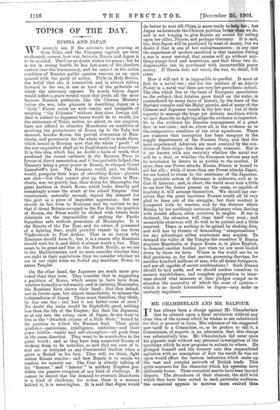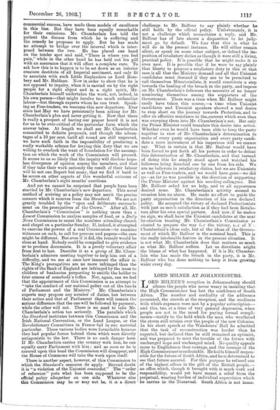MR. CHAMBERLAIN AND MR. BALF01TR.
IT has always been a charge against Mr. Chamberlain that he entered upon a fiscal revolution without any clear idea of the system which he wishes to see substituted. for that at present in force. His reference of the suggested new tariff to a Committee, or, as he prefers to call it, a Commission, of experts is an admission that this charge was substantially true. Mr. Chamberlain did enter upon his gigantic task without any personal investigation of the questions which he now proposes to submit to others. He plunged himself and the country into this unparalleled agitation with no conception of how the result he was set upon would affect the various industries which make up the vast and complex network of British trade. This quite accounts for the character which his speeches have uniformly borne. Their oratorical merits have been beyond dispute. The abundance of their rhetoric, the skill with which they have been suited to each particular audience, the occasional appeals to motives more exalted than commercial success, have made them models of excellence in this line. But they have been equally remarkable for their omissions. Mr. Chamberlain has told the patient the disease from which he is suffering and the remedy he proposes to apply. But he has made no attempt to bridge over the interval which is inter- posed between the two. He has placed one hand on the tender spot and said, " There is where you feel pain," while in the other hand he has held out his pill with an assurance that it will effect a complete cure. To ask how this is to happen is to be set down as an inferior creature destitute of all Imperial sentiment, and only fit to associate with such Little Englanders as Lord Rose- bery and Mr. Haldane. Now in order to show that he is not opposed to inquiry, when it is carried on by the right people for a right object and in a right spirit, Mr. Chamberlain himself undertakes the work, not, indeed, in his own person—that might involve too much unfamiliar labour—but through experts whom he can trust. Speak- ing as Free-traders, we welcome this new departure. Ever since last May we have persistently been asking for Mr. Chamberlain's plan and never getting it. Now that there is really a prospect of having our prayer heard it is not for us to be over-critical of the particular form which the answer takes. At length we shall see Mr. Chamberlain committed to definite proposals, and though the advan- tages of a 10 per cent. tariff all round are still unproved, we have such faith in the impossibility of producing a really workable scheme for levying this duty that we are willing to overlook the want of foundation for the assump- tion on which the work of the Commission will proceed. It seems to us so likely that the inquiry will disclose hope- less divergence of opinion among the members, and that if they take their work seriously the result of their labour will be not one Report but many, that we find it hard to be severe on other aspects of this wonderful outcome of Mr. Chamberlain's eight months' exertions.
And yet we cannot be surprised that people have been startled by Mr. Chamberlain's new departure. This novel method of arriving at a policy may not merit the precise censure which it receives from the Standard. We are not greatly troubled by the " open and deliberate encroach- ment on the prerogatives of the Crown." After all, Mr. Chamberlain's " Commission " is nothing more than a Lancet Commission to analyse samples of food, or a Daily News Commission to count the numbers attending church and chapel on a particular Sunday. If, indeed, it attempted to exercise the powers, of a real Commission—to examine witnesses on oath, to call for persons and papers—the case might be different. But even if it did, the remedy would be close at hand. Nobody could be compelled to give evidence or to produce documents. It is a purely voluntary affair from first to last. Describe it as a group of Mr. Cham- berlain's admirers meeting together to help him out of a difficulty, and we see at once how innocent the affair is. The King's prerogatives are no more infringed than the rights of the Bank of England are infringed by the issue to children of banknotes purporting to entitle the holder to fOur ounces of somebody's toffee. Nor, again, can we feel that the appointment of this Commission is an attempt to " take the conduct of our national policy out of the hands of Parliament and the Ministry." Mr. Chamberlain's experts may propose any number of duties, but between their action and that of Parliament there will remain the serious difference that the one will be followed by payment, while the other will not. There is no need to take Mr. Chamberlain's action too seriously. The parallels which the Standard institutes between this Commission and the Irish National Convention, or the Land League, or the Revolutionary Committees in France fail in one material particular. These various bodies were formidable because they had popular forces behind them which were directly antagonistic to the law. There is uo such danger here. If Mr. Chamberlain carries the country with him, he can equally carry Parliament with him ; and as soon as he is assured upon this head the Commission will disappear, and the House of Commons will take the work upon itself.
There is another aspect, however, of this Commission to which the Standard's censures do apply. Beyond doubt it is " a violation of the Unionist concordat." The " order of reference " puts what has been supposed to be the official policy altogether on one side. Whatever else this Commission may be or may not be, it is a direct challenge to Mr. Balfour to say plainly whether he still holds by the official policy. Unfortunately, it is not a challenge which necessitates a reply, and Mr. Balfour has of late shown a disposition to let judg- ment go by default. We fear that this is what he will do in the present instance. He will either remain silent, or speak on some other subject, or defend the im- position of retaliatory duties as though it were still a living, practical policy. It is possible that he might make it so even now. It is possible that if he were to say plainly that liberty to propose a retaliatory duty in this or that case is all that the Ministry demand and all that Unionist candidates must demand if they are to be permitted to call themselves Ministerialists, it would constitute a step towards the healing of the breach in the party, and impose on Mr. Chamberlain's followers the necessity of no longer numbering themselves among the supporters of the Government. There was a time when Mr. Balfour might easily have taken this course,—a time when Unionist candidates and Unionist speakers showed a real desire to stop short on the journey towards Protection, and to offer an effective resistance to the currentwhich even then was sweeping them into Mr. Chamberlain's net. But only the Prime Minister could. translate this desire into action. Whether even he would have been able to keep the party together in view of Mr. Chamberlain's determination to make of every party organisation and every party candi- date a mere instrument of his imperious will we cannot say. What is certain is that Mr. Balfour would have been forced to put forth all his powers in order to defeat this determination of Mr. Chamberlain, and that instead of doing this be simply stood apart and watched his followers being detached one by one from his side. We are no believers in retaliatory duties, but we are Unionists as well as Free-traders, and we would have gone—we did go—as far as was possible in the direction of supporting the Prime Minister against his seceding colleagues. But Mr. Balfour asked for no help, and to all appearance desired none. Mr. Chamberlain's activity seemed to occasion him no alarm. He made no effort to guide the party organisation in the direction of his own declared policy. He accepted the victory of declared Protectionists with just as much satisfaction as if they had been Retalia- tors after his own special pattern. And now, if he makes no sign, we shall have the Unionist candidates at the next by-election treating Mr. Chamberlain's Commission as created to prepare the way fur the victory, ii,,t of Chamberlain's ideas only, but of the ideas of the Govern- ment of which Mr. Balfour is the nominal head. This is the really intolerable feature in the present situation. It is not what Mr. Chamberlain does that matters so much as what Mr. Balfour suffers. Let us distribute aright the blame of what has happened. If it is Mr. Chamber- lain who has made the breach in the party, it is Mr. Balfour who has done nothing to keep it from growing wider every day.







































 Previous page
Previous page